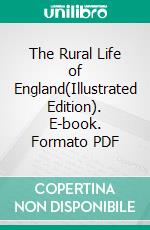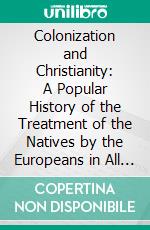William Howitt eBooks
eBooks di William Howitt di Formato Pdf
The Rural Life of England(Illustrated Edition). E-book. Formato PDF William Howitt - Ionlineshopping.Com, 2019 -
The Rural Life of England, written in 1838 by William Howitt, author and Quaker, is a survey of the rural English countryside. It contains anecdotes and observations of the people, traditions and customs of the countryside, as well as pieces of local gossip. Above all, however, it is an ode to the beauties of nature and the English landscape. It was published in 2 volumes, divided into parts such as ‘Cottage Life’ and ‘Popular Festivals and Festivities’. Published at the height of industrial revolution, Howitt evokes romantic sensibilities and reflects on the changes brought to rural areas. Although Howitt’s tone is nostalgic, his prose remains optimistic about the numbers of people who still maintain England’s traditions. During the 19th century The Rural Life of England was an influential text. Critics of Emily Brontë’s Wuthering Heights have drawn on The Rural Life of England to contextualise Heathcliff’s identity. Christopher Heywood, for instance, argues that Heathcliff is a black slave. He contends that Brontë displays an acute awareness of how slave-owning inextricably shaped her local area, and suggests that this awareness was raised by Howitt’s references to Jamaican plantation ownership in families of north-west Yorkshire. These local histories, Heywood maintains, are woven into Brontë's novel. Ultimately, Heathcliff’s identity remains undefined and indefinable. Yet Howitt’s text may help to shed light on the descriptions Nelly Dean and others apply to Heathcliff. Compare how Howitt’s descriptions of Lancashire’s ‘wild’ children (pp. 285-89) resonate with Nelly’s story of Heathcliff’s adoption into the family. Liverpool, where Heathcliff is found by Mr Earnshaw, fell within the boundary of Lancashire during the 19th century. Heathcliff is frequently called a ‘gypsy’; Howitt’s chapter on ‘Gypsies’ reveals that Roma communities were commonly seen in the English countryside. Howitt suggests that they dominated the English imagination, frequently appearing in works of poetry and literature. Of greatest interest, perhaps, Howitt records the English confusion and anxiety surrounding their racial (in)determinacy, an anxiety which other characters freely apply to Heathcliff and which only intensifies as he transgresses class structures.
Colonization and Christianity: A Popular History of the Treatment of the Natives by the Europeans in All Their Colonies. E-book. Formato PDF William Howitt - Forgotten Books, 2017 -
The object of this volume is to lay open to the public the most extensive and extraordinary system of crime which the world ever witnessed. It is a system which has been in full operation for more than three hundred years, and continues yet in unabating activity of evil. The apathy which has hitherto existed in England upon this subject has proceeded in a great measure from want of knowledge. National injustice towards. Particular tribes, or particular individuals, has excited the most lively feeling, and the most energetic exertions for its redress, — but the whole wide field of unchristian opera tions in which this country, more than any other, is engaged, has never yet been laid in a clear and compre hensive view before the public mind. It is no part of the present volume to suggest particular plans of remedy. The first business is to make known the nature and the extent of the evil, — that once perceived, in this great country there will not want either heads to plan or hands to accomplish all that is due to the rights of others, or.

